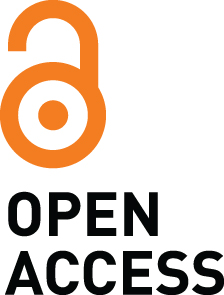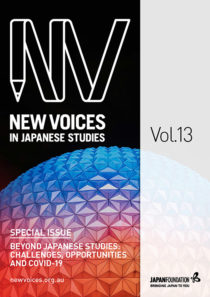1. Editorial Oversight
Each volume of New Voices in Japanese Studies is edited by a Series Editor and a Guest Editor in consultation with the Editorial Board. The Series Editor is an employee of The Japan Foundation, Sydney. The Guest Editor position is a rotating position. A different Guest Editor is appointed to provide academic oversight for each different volume.
Guest Editor appointments are made by the Series Editor and approved by the Director of The Japan Foundation, Sydney based on the following criteria:
- Affiliated with a university in Australia or New Zealand at the time of appointment
- Holds a PhD
- Has published peer-reviewed Japan-related research in the humanities, social sciences or related fields
- Is able to commit to reviewing and commenting on all manuscripts at all stages from submission to layout for the volume they are appointed to oversee
- Is an early to mid-career scholar
The Editorial Board rotates with each volume, depending on the submissions requiring review. Membership of the Editorial Board is determined collaboratively by the Guest Editor and the Series Editor, based on the following criteria:
- Holds a PhD
- Has published peer-reviewed Japan-related research in the humanities, social sciences or related fields
- Expertise overlaps with a submission requiring review
- Is not a supervisor of, or otherwise deemed likely to be able to identify, the author of the paper when reviewing said submission
A list of Guest Editors and Editorial Boards for all volumes can be found on the Editorial Information page. Guest Editor and Series Editor profiles can be found on the Editor Profiles page.
2. Authors
i. Eligibility
In accordance with the journal’s aims (see About page), authors must fit one of the following categories:
- Honours graduate
- Masters (Research) graduate
- PhD candidate or recent graduate
In addition, in line with the publisher’s remit, authors must also satisfy regional criteria by having ties to Australia or New Zealand. For further details on author eligibility, refer to the Call for Papers page.
ii. Instructions to Authors
Instructions for contributing authors can be found on the Submission Guidelines page (for papers) and the Review Guidelines page (for reviews).
An overview of the editorial process for authors is provided on the Editorial Process page, and an editorial vision statement is provided on the Editorial Vision page.
3. Submissions
i. Eligibility
New Voices in Japanese Studies accepts submissions that meet the following criteria:
- Sole-authored
- Scholarly work from the humanities, social sciences or a related discipline, with a focus on Japan
- Author meets the criteria discussed in 2.i above.
- Submission is the stated author’s own original work
- Submission is supported by a recommendation from an academic supervisor (or academic of similar standing) who is familiar with the author’s work
- Content has not been previously published, and is not due to be published by another platform
Submissions that do not meet the above criteria will not be considered for publication.
ii. Selection Process
The decision to publish eligible manuscripts is based on the following criteria:
- Recommended for publication and judged to be an original contribution to literature by two or more expert peer-reviewers
- Clear expression
- Clear argument and structure
- Argument is supported by evidence
- Sources are appropriately acknowledged
Submissions that do not meet the above criteria upon first review will be dealt with in one of two ways. In cases where the reviewers note potential in the work, the author will be offered the opportunity to revise the submission in line with reviewer feedback. In cases where reviewers do not note potential in the work or otherwise express concerns regarding originality, the work will not be considered for publication. In the event that reviewers express concerns about originality, the referee for the submission will be notified.
For further information, see Submission Guidelines.
4. Plagiarism
i. Verifying originality and authorship
New Voices in Japanese Studies has the following measures in place throughout the submission and editorial process to verify the originality and authorship of submissions.
a) Sole-authored manuscripts only
In not considering papers by multiple authors, NVJS negates potential issues of honorary/guest authorship.
b) Referee form
Submissions must be supported by a recommendation from an academic supervisor (or academic of similar standing) who is familiar with the author’s work and can speak for its originality and contribution to literature. Recommendations are submitted by the referee directly to the author via a recommendation template provided by the journal. Submissions that are not supported by a recommendation are not considered for publication.
c) Peer review
All submissions are double-blind peer-reviewed by at least two experts in a related field to verify originality and to ensure that they represent a valid contribution to literature. Where reviewers provide conflicting opinions, the opinions of (an) additional reviewer(s) may be sought until a decision can be made.
d) Similarity Check
All submissions are analysed with anti-plagiarism software (Crossref’s Similarity Check, powered by Ithenticate), and the results are reviewed to ensure that manuscripts are the stated author’s original work and that sources are credited appropriately. In the case that some sources have not been appropriately acknowledged (to a minor extent), the author will be given the opportunity to revise the submission to ensure that appropriate acknowledgement is made. In the case that a more widespread lack of acknowledgement emerges and/or there is doubt about the originality of the submission, the submission will not be considered for publication.
5. Accessibility
New Voices in Japanese Studies is committed to open-access publishing. All content in New Voices in Japanese Studies is free for readers to access, and no submission or publishing fees are charged to authors at any stage of the process.
More information regarding licensing and permissions is provided on the Permissions page.
6. Funding
New Voices in Japanese Studies is fully funded by The Japan Foundation, Sydney. No fees are charged to authors or readers, and the journal receives no grants, advertising revenue, subscriber revenue nor any other form of revenue from external sources.
Proudly Open Access

Related Links
Latest Volume
‘Beyond Japanese Studies’
Special Issue

